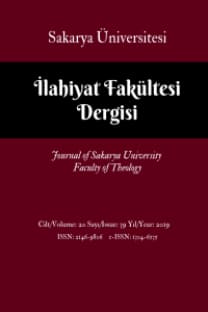MÜTEŞÂBİH ÂYETLERİN YORUMU KAPSAMINDA İBN FÛREK’İN TEFSÎRİ
Tefsîr ilminin en önemli konularından birisini müteşâbih âyetlerin anlaşılması ve yorumlanması teşkil etmektedir. Kelam ilminin önemli simalarından olan İbn Fûrek, kaleme almışolduğu tefsîrinde müteşâbih âyetlerin te’vîline önem vermiş, seleften farklı bir yol izleyerek te’vîlci yaklaşımı benimsemiştir. Özellikle müteşâbih hadîslerin yorumuna dair kaleme aldığı Müşkilü’l-hadîs ve beyânuh adlı eserinde âyet ve hadîslerde yer alan müteşâbih ifâdelere, belirli ilke ve prensipler çerçevesinde yorumlar getirme hedefinde olan İbn Fûrek’in tefsîrindeki metodunun müstakil irdelenmesi, müteşâbih âyetler hakkındaki görüşlerinin bilinmesi, önem arz etmektedir. Öte yandan İbn Fûrek’in kelâmi problemlerin tartışıldığı bir dönemde hayat sürmesi, bu devrin problemlerine çözümler üretme hedefinde olmasıkonunun önemini bir hayli artırmaktadır. Bu sebeple makalemizde öncelikle İbn Fûrek’in hayatına ve tefsirine kisaca temas edilmiş, sonrasında ise müteşâbih âyetlerin anlaşılmasında dikkat çeken Selef, Müşebbihe-Mücessime, Mutezile ve Halefin yaklaşımlarına değinilmiştir. Makalenin son bölümünde ise bu dörtlü tasnifte Halef âlimlerinin çerçevesine dâhil olan, yani müteşâbih âyet ve hadîslerin belirli ilke ve prensiplerle yorumlanması gerektiği görüşünü savunan İbn Fûrek’in müteşâbih âyetlere yaklaşımı tefsîrinin elimizdeki matbû nüshalarından istifâde edilmek suretiyle işlenmiştir.
Tafseer of Ibn Furek Concerning Allegorical Verses
Understanding and interpretation of allegorical verses are regarded as one of the most significant topics in Quranic Exegesis. Ibn Furek, one of prominent scholars in science of Kalam, has given importance on interpretation of allegorical verses in his Tafseer, and he has embraced an interpretive method which is a different one from the traditional approach. In particular, it is essential to understand his thoughts on interpretation of allegorical verses, and to examine method of Ibn Furek’s Tafseer discretely, Mushkilu’l-hadith ve bayanuh, in which he has striven to provide commentaries within the scope of certain tenets and principles. Moreover, the time period in which he lived has witnessed to major problems of Kalam. Ibn Furek is a scholar who experienced those problems and sought solutions for the problems. This increases importance of the topic I deal with in this paper. The article consists of four parts. Biography of Ibn Furek and a brief examination of his tafseer takes place within the first two parts of this study. Then, I point to approaches of some scholars who draw attention to allegorical verses, including a few scholars from salaf ( the predecessor), khalaf (the successor), and some figures from Mutazila, Mucessima and Mushabbiha. Views of Ibn Furek on allegorical verses which are in line with those of the predecessor scholars are presented in the last part of the article. I have drawn on extant Tafseer of Ibn Furek so as to lay out his views in the last part of this study.
Keywords:
Allegorical, Ibn Furak, ta’wil,
- ISSN: 2146-9806
- Yayın Aralığı: Yılda 2 Sayı
- Başlangıç: 2001
- Yayıncı: Sakarya Üniversitesi
Sayıdaki Diğer Makaleler
Index 16. Cilt/ 30. Sayı (2014/2)
ENDÜLÜS FIKIH GELENEĞİNDE NEVÂZİL EDEBİYATI
ZECCÂC’IN (ö. 311/923) KIRAATLERE BAKIŞI
MECAZIN TERİMLEŞME SÜRECİ VE İBN TEYMİYYE ÖNCESİ MECAZA İTİRAZLAR
BUHÂRÎ’NİN SİYER VE MEĞÂZÎ RİVÂYETLERİNE YAKLAŞIMI
Klasik arap şiir ve teorik hitabında tazmîn (enjambment) ve yapısal uyum üzerine
MÜTEŞÂBİH ÂYETLERİN YORUMU KAPSAMINDA İBN FÛREK’İN TEFSÎRİ
İCMÂ TEORİSİ VE BÂKILLÂNÎ’NİN ETKİSİ
Sadruddîn Konevî Aslen Endülüslü mü idi?
DİNDAR-SİYONİST HAHAMLARIN FETVALARINDA İSRAİL DEVLETİ’NDEKİ YAHUDİ OLMAYANLARIN STATÜSÜ
